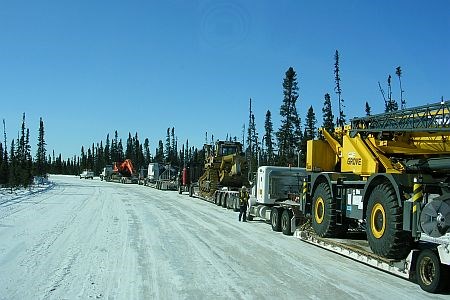The Nishnawbe Aski Nation (NAN) is struggling to cope with the devastating financial impact of the shortened winter road season, amidst declarations of a state of emergency for the 29 affected communities in the Far North.
The unseasonably warm weather has halved the life of the winter roads this year from six weeks to three, threatening everything from construction projects to the economic viability of day-to-day life.
"Things are in chaos right now, as the weather was warmer than usual, and spring came six weeks early, so when it hit us like this, it came as a total shock," says NAN Grand Chief Stan Beardy.
"We've never seen that happen before and it will have an overall very huge impact on us because costs will be tripled (to fly in goods) over what they are with ground transportation. Many people are on fixed incomes, so this is a very real problem."
Typically, the winter road provides Far North communities with a low-cost window to have goods and materials brought in.
This includes the building supplies needed to repair and undertake construction projects such as housing and other major projects, which are threatened for the year unless the materials are flown in at great cost. The majority of stimulus-funded construction projects through these communities are in the early phase, but the March 2011 deadline means the pressure is on.
What's more, the road is also used by community members in March to do personal shopping for items like flour, sugar, oats and laundry detergent, which is stockpiled for the coming year. Similarly, community stores use the time to bring goods in bulk to keep costs down.

Things are in chaos right now."
Stan Beardy,
Grand Chief,
Nishnawbe Aski Nation
What's more, the lack of links to the hydro grid in these remote areas means the use of diesel generators is often required to power community facilities, schools, nursing stations and medical clinics, stores, band offices and businesses. The lack of prolonged road access this year means that diesel may well run out, leaving facilities and companies literally powerless.
Beardy also expresses concern with the ability of residents to supplement their diet with hunting, fishing and trapping in the Far North. The high price of gas that will have to be flown in will affect their ability to harvest as well, he says.
Traditionally, the winter road is built on a foundation of frost and three feet of ice for transports to travel across the typically swamp-like muskeg throughout the region.
The lack of frost through the unseasonal weather prior to Christmas meant the heavy construction equipment was unable to travel the trails or to cross creeks and rivers, and the road construction work could not be completed at its usual time.
While January brought sufficiently cold weather for work to begin, the construction process requires time for the trail to be patted down and snow to be cleared from the lakes and rivers for the frost to set in. Two to three weeks later, the ice is typically thick enough to accommodate heavy traffic, which this year was ready by mid-February.
However, the thaw began to hit by early March, drastically shortening the time the winter road communities had available to transport all manner of necessary goods.
"My elders have been telling me for the last 10 years that there have been major changes in the climate. The ice is brittle, there's less snow, those type of things."
Nearly $3.8 million has already been provided by the federal government to assist with these issues. While Beardy says more is needed to offset impending costs, the exact total is uncertain as cost estimates for all the needed supplies and construction projects have yet to be tallied.
"We are part of Canada, and we are part of Ontario," says Beardy. "At any time residents of Canada or Ontario are in an emergency state or crises, the government has to stand up and provide the essential right to access a certain quality of life, and that's all we're asking for like anyone else."
To cope with the problem of mild winters and shorter seasons in the future, many of the area chiefs are meeting to realign the routing of the winter road to higher ground.
The long-term solution, however, lies in all-winter roads, which Beardy says will be needed regardless to open up the Far North to the extraction of resource-related wealth.
"The dollar cost is significant, but the return is very attractive."




